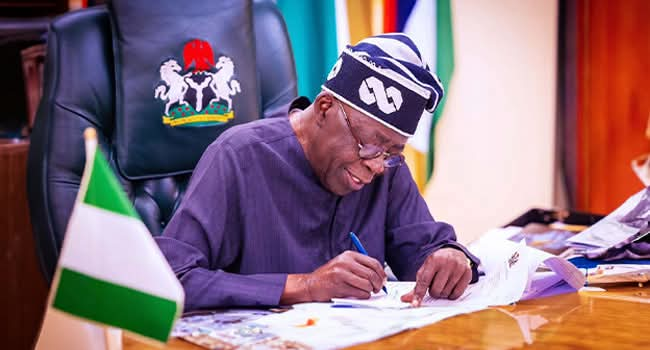How Tinubu’s foreign policy benefits the common man
teeth: defending Nigeria’s sovereignty not just at the borders, but within and across borders.
The wave of deflections
The energy sector has also been reignited. Nigeria’s visibility in global energy forums and policy clarity encouraged final investment decisions from firms like Shell, helping to rebuild refining capacity and energy security. Moreover, $8bn commitments in oil and gas investments and the new deepwater project approved have aided rural electrification, water solutions, healthcare, and education, bringing consistent electricity to hundreds of schools, clinics, and farms.
Under this administration, foreign policy has become a tool for economic repair. The Tinubu administration’s bold reforms and high-level diplomacy have also translated to macroeconomic and foreign exchange stability and debt clearance. Strategic negotiations with the IMF and Afreximbank demonstrate how foreign policy was used to restore macroeconomic confidence and stabilise the currency, laying the groundwork for growth. The tangible result of this is over $10bn in FX debt cleared, and foreign reserves rising from $3.99bn to $23.11bn. For traders in Alaba and Kano or importers in Aba, this means stabilised exchange rates and slashed import costs, which trickle down to improved accessibility and affordability of basic necessities across Nigeria.
When President Tinubu renewed the N3.28tn currency swap with China in 2024, it was not a handshake in a boardroom – it was a lifeline for Nigerian traders. While critics dismissed it as technocratic, for traders in Alaba, Kano, Idumota, Onitsha and others, it was a lifeline to finally bypass the dollar squeeze and get their goods moving. By trading directly in yuan, they dodged middlemen, cut costs, and shielded their hustle from forex chaos. That is not abstract economics. That is a president putting firepower behind the market woman’s survival, the trader’s daily bread and the consumer’s hard-earned resources. In a volatile global economy, President Tinubu took bold diplomatic action to defend Nigeria’s economic backbone: its entrepreneurs.
Q4 2024 saw Nigeria hit 3.84 per cent GDP growth – the highest in three years. This is not a coincidence. It is the result of deliberate diplomacy that aligns global capital with national needs. This, alongside restructuring under the G20 Common Framework and concessional lending from multilateral lenders, has freed resources for public investment and growth.
Tinubu’s foreign policy recognises Nigeria’s greatest asset: its youth, with over 70 per cent of Nigeria’s population under 30. His foreign policy has focused on removing barriers to opportunities for Nigeria’s youth through global financing for human capital. Partnerships with the World Bank, Afreximbank, and European Investment Bank secured over N80bn to revamp 8,000 primary health centres. In addition, over 300,000 students received education loans, and 900,000 women and youth entrepreneurs accessed grants and credit schemes. And the $800m World Bank-supported cash transfer programme? It reached 15 million households, putting money directly in the hands of the underserved. This is foreign policy, repurposed as social policy for the benefit of Nigerians, especially those at the lower rung of the social and economic ladder.
President Tinubu understands what every market woman in Lagos or mechanic in Benin knows – the Nigerian abroad is feeding families at home. Diaspora remittances consistently contribute over $20bn annually to Nigeria’s economy. This contribution is overwhelmingly funnelled directly to households and families, providing a vital cushion to meet basic needs, invest in education and healthcare, improve standards of living and eventually contribute to poverty reduction. His foreign policy has opened new possibilities for global Nigerians, and, by extension, their families and communities at home. By re-engaging the UAE, normalising labour migration pathways with Germany and Canada, and expanding legal routes for skilled migration, President Tinubu restored opportunities for workers and traders and expanded legal channels for skilled professionals. The result is higher remittances, professional mobility, and stronger transnational families. Nigeria’s second-largest FX stream – the diaspora – has been empowered and organised under Tinubu’s watch.
Some may ask: What is Tinubu’s foreign policy really about? It is about results. Nigerians are seeing cheaper food, more stable currency, safer borders, and new jobs. These diplomatic missions have yielded clear, measurable results with millions reached through cash programmes, significant cuts in food prices, thousands of rural homes electrified, and new chances for youth and diaspora families. That is not diplomatic jargon. It is what the market woman in Kaduna or the farmer in Benue really cares about.
It is noteworthy that continuing domestic insecurity, particularly insurgency in the Northeast and communal violence in the Middle Belt, undermines Nigeria’s standing on the diplomatic platforms for peace and security, especially in these people’s lives. Nevertheless, unrelenting effort continues to be applied in the art and science of domestic and foreign policy to address these challenges.
President Tinubu’s foreign policy does not sit in glass towers. It draws inspiration from and marches the streets, rides the buses, and lives in the daily hopes of ordinary Nigerians. It is high-level diplomacy which is anchored on and used to drive grassroots impact. Tinubu is not just shaking hands abroad; he is building foundations at home and impacting lives.
Oshodi is the Senior Special Assistant to the President of Nigeria on Foreign Affairs and Protocol



